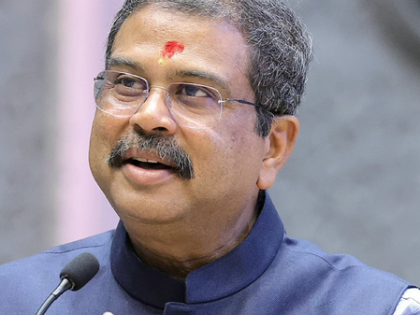1.46 lakh smart classrooms in schools approved till May 31: Dharmendra Pradhan
By IANS | Updated: July 28, 2025 16:34 IST2025-07-28T16:26:30+5:302025-07-28T16:34:34+5:30
New Delhi, July 28 As of May 31, 2025, a total of 1,46,040 smart classrooms have been approved ...

1.46 lakh smart classrooms in schools approved till May 31: Dharmendra Pradhan
New Delhi, July 28 As of May 31, 2025, a total of 1,46,040 smart classrooms have been approved across the country as part of the Centrally Sponsored integrated scheme for school education, Samagra Shiksha, the Lok Sabha was informed on Monday.
Minister of Education Dharmendra Pradhan, in reply to a question on steps to introduce smart classrooms in rural areas, said there are 5,155 smart classrooms in Maharashtra, 9,531 in the State of Madhya Pradesh and 192 in the UT of Dadra and Nagar Haveli.
Sharing details of the financial implications, the Minister said the non-recurring grant for Smart Classrooms (2 smart classrooms per school) is of Rs 2.40 lakh, and the recurring grant is Rs 38,000 (including e-content and digital resources, charges for electricity).
He was replying to a question by Shiv Sena MP Sandipanrao Bhumre and BJP MP Kalaben Delkar.
The Department of School Education and Literacy is implementing Samagra Shiksha – an Integrated Scheme for School Education from 2018-19.
“It is an overarching programme envisaging the ‘school’ as a continuum from pre-school to Grade 12, running in the country, including the rural areas. The vision of the scheme is to ensure inclusive and equitable quality education in accordance with the National Education Policy 2020,” said Pradhan.
The Government of India, as part of the Budget 2025, has announced the provision of broadband connectivity to all government secondary schools in rural areas under the BharatNet project to enhance digital infrastructure in remote areas, he said.
The Education Minister said the State/UT Governments have been advised to act based on the situation prevailing at every place to meet the demands of students and teachers for providing them with the digital access required for teaching and learning digitally.
The National Education Policy 2020 calls for investment in digital infrastructure, online teaching platforms and tools, virtual labs, digital repositories, online assessments, technology and pedagogy for online teaching-learning, etc, for which various initiatives have been taken.
For school education, digital literacy programmes to students, teachers and all stakeholders have been extended with necessary funding mechanisms under Samagra Shiksha for all States/UTs, in alignment with NEP 2020.
Disclaimer: This post has been auto-published from an agency feed without any modifications to the text and has not been reviewed by an editor
Open in app